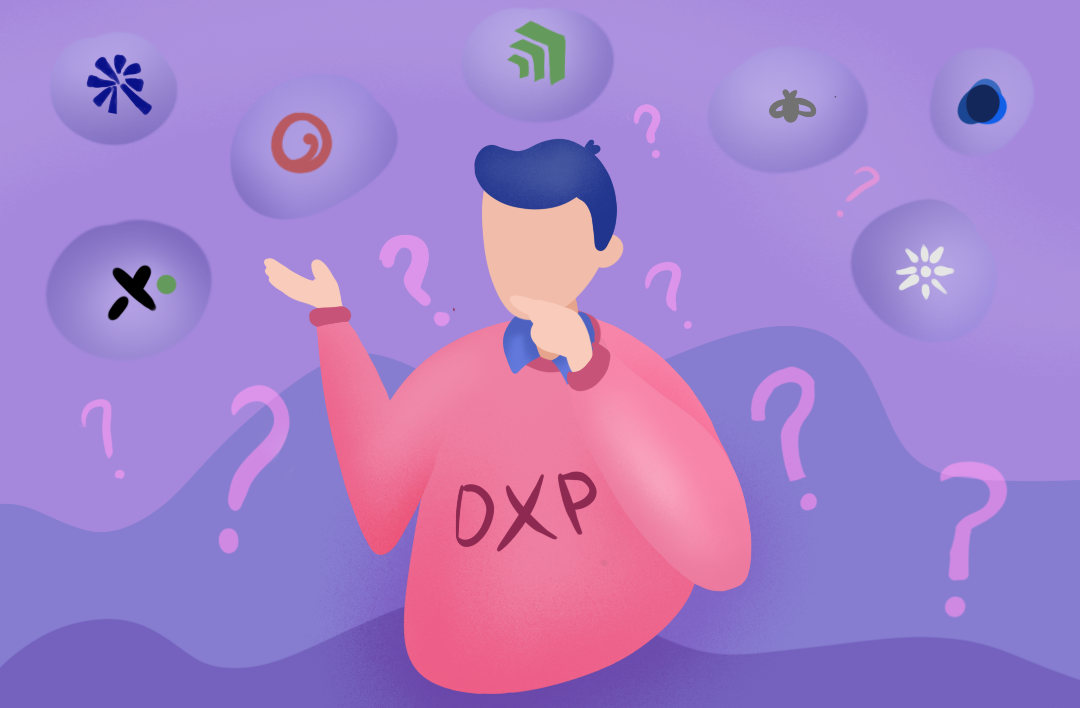6 popular questions asked about Digital Experience Platforms (DXP)

Working with digital technologies means to be constantly learning new tools, platforms, and approaches. Recently we have been introduced to a new term - “Digital experience platform” or a DXP. In this blog post we put together 6 of the most commonly asked questions about DXP and tried to answer them for you.
-
What is a DXP?
According to Gartner, a Digital Experience Platform or a DXP, is “an integrated set of technologies, based on a common platform, that provides a broad range of audiences with consistent, secure and personalized access to information and applications across many digital touchpoints.”
DXPs can be a single product but are often a suite of products (such as portals, content management systems (CMS), analytics and search) that work together. DXPs provide an architecture for companies to digitize business operations, deliver connected customer experiences, and gather actionable customer insight.
Some (not all) DXPs can be complex and multi-faceted technologies. They vary from vendor to vendor and cater for different needs, from the specific software employed, and the volume and richness of data fed into the system, and the capabilities they yield for marketers and developers alike.
-
Is DXP a new version of CMS?
Yes. A DXP is an evolution of a traditional static CMS. CMS's have had to evolve with time, as more data has been generated by users and more touch points were created by the businesses. The key difference between the two is that DXP offers infinitely more opportunities to craft highly creative and truly tailored experiences for customers as they navigate through an omnichannel commercial landscape. This is achieved by DXPs having more sophisticated digital marketing tools including content personalization, A/B testing, omnichannel marketing, and much deeper marketing analytics.
-
Is it the same as UXP and CXP?
Yes, User Experience Platform (UXP) and Customer Experience Platform (CXP) are just other names of a DXP.
-
What can a DXP do for you?
The three main capabilities the DXP can provide you with are:
With a DXP you can sync, manage, and push consistent content across an array of channels from desktop and mobile to social, email, e-commerce, and more.
A DXP can help you define consumer profiles at the most granular level. This is achieved through tracking search history, browsing history, purchasing history, social media interactions, location and demographics to know what consumers want, when they want it, and where they want it.
A well optimized DXP can boost e-commerce performance and productivity. Advanced testing, machine learning, and huge data sets allow for individually tailored shopping experiences for your users.
-
What are the key benefits of a DXP?
DXP's provide benefits for all major stakeholders across the digital value chain. Here are the main ones:

-
Which DXP should I choose?
Different parameters DXPs could be compared on include:
- Quality of support
- Ease of use
- Ease of admin and setup
- Market share
- Platform performance and reliability
- How easy it is to do business with the DXP provider
You can also turn to DXP Grid Scoring. It gives an excellent decision-making support, as it has all the data in one place. The Grid represents the democratic voice of real software users, rather than the subjective opinion of one analyst. G2 rates products from the Digital Experience Platforms (DXP) category algorithmically based on data sourced from product reviews shared by G2 users and data aggregated from online sources and social networks.
The resent scoring report recognised a number of our partners including Sitefinity, Sitecore and Kentico. This was based on a variety of factors, including features and functionality, market presence and customer satisfaction. Sitefinity has been named a Leader based on receiving a high customer satisfaction score and having a large market presence, while Sitecore and Kentico has been named a Contender and a High Performer accordingly.
At Arekibo, we work with DXP and CMS platforms everyday, so if you have any questions or are interested in discussing the possibility of using a DXP for your business, contact us today.